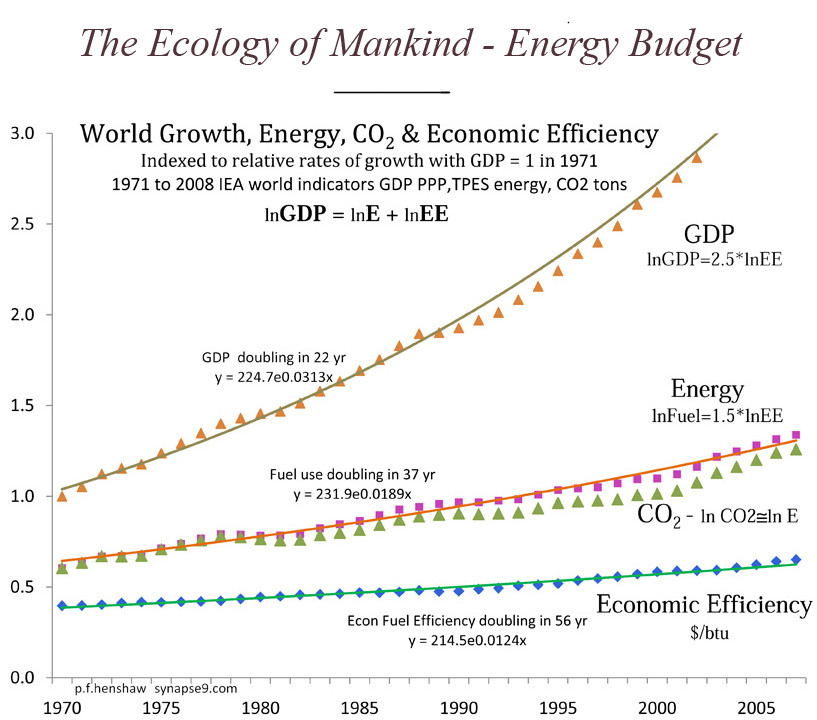Dan Ariely gave a recent talk on some of his new “Predictably Irrational” research. It stimulated my thinking to ask, using his approach, “What beliefs do people not dare check?”.

The example below suggests that is a problem for the green movement, regarding why it has been ineffective in slowing the growth of economic impacts. Dan replied “force yourself to do a systematic analysis and listen to the analysis”.
That’s good advice, to “listen to the analysis”. Aren’t we ALWAYS supposed to listen to your own analysis?? There seem to be regularly reoccurring ways in which we don’t, making a big difference in our impacts on the earth. As Ariely asks:
Are we more likely to … check our beliefs if they are based largely on agreements with others, or if they are based largely on direct observation?
You can tell already what the answer to that is, that questioning beliefs that are based on agreements threatens the belief system and the complex social network… and checking them would question the integrity of everyone and be perceived as a threat. In most groups that would risk dissention and loss of personal status to even bring up. Questioning beliefs that are readily checked is easy for people to understand and discredits no one’s integrity, so decisions about checking are just balances of costs and benefits that are readily discussed.
So, if we’re naturally blocked from checking cultural beliefs that are not working… 1) what kinds of irrationality do we construct to avoid confronting the observations confirming it, and 2) what would give people the self-confidence to at least consider the balance of costs and benefits involved?
I’d be glad to have any comments or suggestions. It seems it can be a daunting problems to renegotiate agreements about social theories of cause and effect in nature. Just look at religions and other strange philosophies. It took many centuries of conflict before even science was able to find rational methods of research.
Sometimes I’ve found it has helped others to simply “suspend theory” temporarily, much as if taking a breath before ducking underwater momentarily,
Use it as a trick to allow yourself to consider culturally disturbing questions or facts. It seems our lives in a very literal way depend on getting these things right, in nature’s opinion, not just our own.
There’s a critical issue of this kind, of some intrigue, requiring a search for new meaning in curiously clear facts that people look at, and find unconnected to any of their familiar issues. That’s the remarkably clear evidence that 40 years of considerable green movement efforts haven’t altered how the world economy works in the slightest.
The proof is simply the dramatically clear and simple and consistent collective behavior of the world economy, as expressed in the world’s most complete data on it, gathered by the IEA for the years 1971 to 2008.

Maybe the best way to say it is to think of 2011 as the 40th anniversary of the green movement (which it approximately is). That would make it now high time we stopped doing “practice exercises” and graduated to somehow applying the way of thinking to something that would actually change the system, i.e., “that worked.
Unless you think the politics and economics of the last two years has reversed what you see happening… what the decades of increasingly popular green consumerism, efficiency efforts, environmental regulation, global activism and sustainability plans have been doing, is not in any way separating the economy from its addiction to ever increasing energy use and accelerating resource depletion.
Even more intriguing is that we have also not in any way changed the proportion of fossil fuels in the world energy mix. The growth rate of CO2 has been virtually identical to the growth rate of energy use, and both have been in constant proportion to both the world’s improving economic efficiency and total GDP!
The data says this by itself, quite directly and firmly, as a simple fact. It does not rely on any theory or complex interpretative probing at all. After 40 years of effort nothing at all is changing in how the economy is multiplying its principal impacts on the earth that are forcing the critical dilemmas of our time.
My detailed studies and thinking about it are described for general informed audiences in other posts to this blog, on my Synapse9 website, and in my research papers on mypublications page. Even my best writings are sometimes difficult reading, though, asmany of the facts are simple but the “memes” are hard.
In my work I found I had to change some of the terms of scientific and social discussion to get anywhere with the facts, like for understanding sets of curves like the above, for which both science and popular discussion seem to have no theory at all. That some of the terms that fit the subject conflict with cultural beliefs that people were afraid to question, of course, just makes the struggle to build the new meanings for them more difficult.
Why these growth curves are so regular, as the economies face great and mounting resistance and erupting costs from environmental conflicts of many kinds, is that humans have been making such a concerted effort to stabilize growth. It’s still widely believed that making money doesn’t necessarily take energy because we don’t see the how the energy uses clearly visible in the data do it.
Even the green movement accepts the precondition for economic policies, from cap and trade to climate change to efficiency performance standards, that maintaining “healthy economic growth” must take precedence over all other objectives. That’s the mistake. It doesn’t tell you how to change the system, but it does help explain why we’re not finding a way to do it. We’re not changing the system because we’re putting our main effort into keeping the system from changing…!
This way of learning from reading the behavior of the economy as a whole system is needed because it concerns the emergence of new forms of organization, for which there is no precedence. That’s what makes my work about discovering new terms of discussion, because it focuses on discovering new subjects of nature.
It takes practice and effort and some new terms itself. Science has never really paid much attention to the natural succession of growth phases as a subject, for example. There are links to how to learn about that at the reference page, “Inside Efficiency”.
What is clear is that for the green movement to become an actually powerful alignment of values, people and the interests of the earth, it needs to get beyond being only emotionally powerful, and having no effect. It clearly needs to change targets somehow, to things that would actually work.
part ed: 2/21/12
